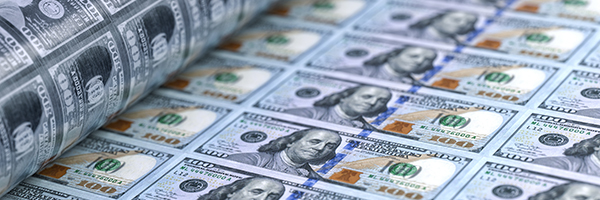Morning Briefing

April 8, 2022 | Daily JAM, Morning Briefing |
Economists surveyed by Bloomberg now say that consumer price index (CPI) inflation will average 5.7% in the final three months of 2022. That’s up from a forecast of 4.5% a month ago. (The March CPI report is due on Tuesday, April 12.) These economists also upped the chances of a recession within the next 12 months to 27.5% from 20% in their forecast a month ago. There are two bad pieces of news in that survey for investors.

April 6, 2022 | Daily JAM, Morning Briefing |
Money markets are pricing in another 225 basis points of increases to the Federal Reserve’s benchmark interest rate by the end of 2022. That’s on top of the 25 basis point increases already delivered in March. The Fed hasn’t done that much tightening–a total of 2.5 percentage points–in one year since 1994.

April 5, 2022 | Daily JAM, Morning Briefing, Short Term, You Might Have Missed |
In remarks prepared for a Tuesday speech to the Minneapolis Federal Reserve Bank Federal Reserve Governor Lael Brainard said “Currently, inflation is much too high and is subject to upside risks. The committee is prepared to take stronger action if indicators of inflation and inflation expectations indicate that such action is warranted.” And she called for reducing the Fed’s balance sheet as early as next month. The bond market certainly heard Brainard’s remarks as a promise of more action faster.

March 31, 2022 | Daily JAM, Morning Briefing, Short Term |
Today, March 31, OPEC+, which includes Russia, decided to stick with their previously agreed plan of modest monthly increases. Despite repeated asks from Washington and European countries to increase production in order to make up for shortfalls from Russia due to Western sanctions on that country as a result of its invasion of Ukraine, OPEC+ said it would increase oil output in May by 432,000 barrels a day, a slight uptick from the agreed increase of 400,000 barrels a day. The small increase–essentially no increase at all–would be for “technical reasons.” OPEC+ repeated its outlook for a month ago saying that the outlook was for “a well-balanced market” and that recent volatility in prices was “not caused by fundamentals, but by ongoing geopolitical developments.” Well, yeah. And isn’t that the point?

March 30, 2022 | Daily JAM, Morning Briefing, Short Term |
Hopes for a cease fire in Ukraine and for serious peace talks between Russia and Ukraine took the stock indexes up yesterday and the price of oil and oil stocks down. News of renewed Russian shelling today took the market back down and oil and oil stocks back up today.

March 29, 2022 | Daily JAM, Morning Briefing |
Yesterday, March 28, a substantial piece of the Treasury yield curve fell into inversion. The yield on the 5-year Treasury climbed to 2.57%. Which put it above the yield of both the 10-year Treasury at 2.46% and the 30-year Treasury at 2.55%.

March 28, 2022 | Daily JAM, FXI, Morning Briefing |
The city of 25 million and China’s financial hub began a phased lockdown today. A wave of Omicron infections hit a record of 3,450 daily asymptomatic cases on Sunday. That’s nearly 70% of China’s total.

March 25, 2022 | COP, Daily JAM, EQNR, Jubak Picks, LNG, Morning Briefing, Volatility |
The United States and Europe have reached an agreement to expand U.S. supplies of natural gas to Europe in an effort to reduce Europe’s dependence on Russian natural gas.
Details are bit vague. And wishful thinking is a big ingredient. The basis problem is that Russia supplies Europe with 150 billion cubic meters of natural gas every year via pipelines. U.S. and other sources can’t match increase production to that level and the infrastructure to get the gas to Europe simply doesn’t exist. Yet the goal has now been put on paper and the agreement promises that Europe will get at least 15 billion cubic meters of additional LNG supplies by the end of the year. Even though it is not clear where the natural gas welcome from or how ti will be delivered.

March 24, 2022 | Daily JAM, Morning Briefing, Short Term |
Initial claims for unemployment set a more than 50-year low last week. The Labor Department reported initial jobless claims, for the week ended March 19, fell to 187,000 versus an expected 210,000 expected and a revised 215,000 for the prior week.

March 23, 2022 | Daily JAM, DJP, Jubak Picks, Morning Briefing, Volatility |
How does the lyric go (as sung by Albert King)? “If it wasn’t for bad luck, I would have no luck at all.” Maybe that song should be the theme song for the global food market right now. This month China’s agriculture minister Tang Renjian told colleagues at a high-profile government meeting in Beijing this month: “China faces big difficulties in food production because of the unusual floods last autumn. Many faming experts and technicians told us that crop conditions this year could be the worst in history.”

March 22, 2022 | Daily JAM, Morning Briefing |
As of the close today, Tuesday, March 22, Treasuries had sold off steeply raising the yield on the 10-year Treasury to 2.38%, a huge (for the Treasury bond market) 9 basis points. The rout took the yield on the 2-year Treasury to 2.16%. On Friday,March 18, the 2-year Treasury yielded 1.94%. The bond market is taking yesterday’s comment/promise/threat from Fed chair Jerome Powell seriously

March 21, 2022 | Daily JAM, Morning Briefing |
Monday was a great day to be invested in stocks. As long as you were invested in commodity stocks.














